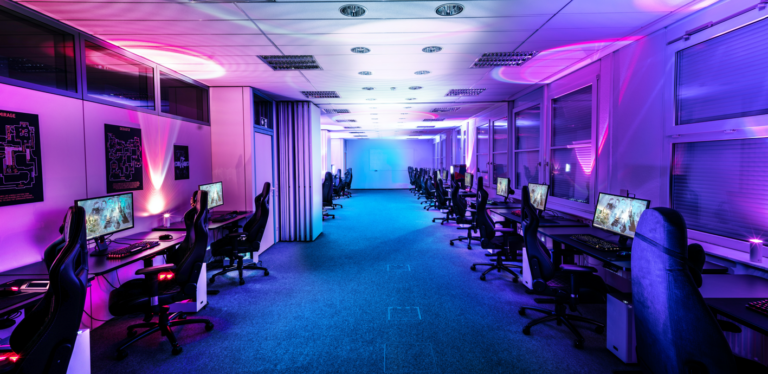China has become the largest market for e-sports in the world. China’s e-sports market revenue increased from 94.7 billion yuan in 2019 to 136.6 billion yuan in 2020, a year-on-year increase of 44.16%. Such massive growth in e-sports comes other markets leverage the trend. In this case, it lead to the rise of e-sports hotels in China. Like an advanced version of the internet café, e-sports hotel provides rooms equipped with gaming rigs, professional headsets, race simulator seats, and excellent quality computer screens. The e-sports hotel market in China is in its expansion phase.
Especially after COVID-19, the number of e-sport hotels in China has exceeded 10,000. In 2020, from March to November, the average monthly growth rate of professional e-sports hotels was about 11%. According to Meadin.com, when looking at the hotel market in China, e-sports hotels only accounted for 5.13% of the whole hotel segment, next to the business hotel, resort hotels, cultural theme hotels, and personalized hotels. The potential market is large, and the current players are only a few. Therefore, the e-sports hotel market in China has great potential to grow. What should brands know about the e-sports hotel market in China.
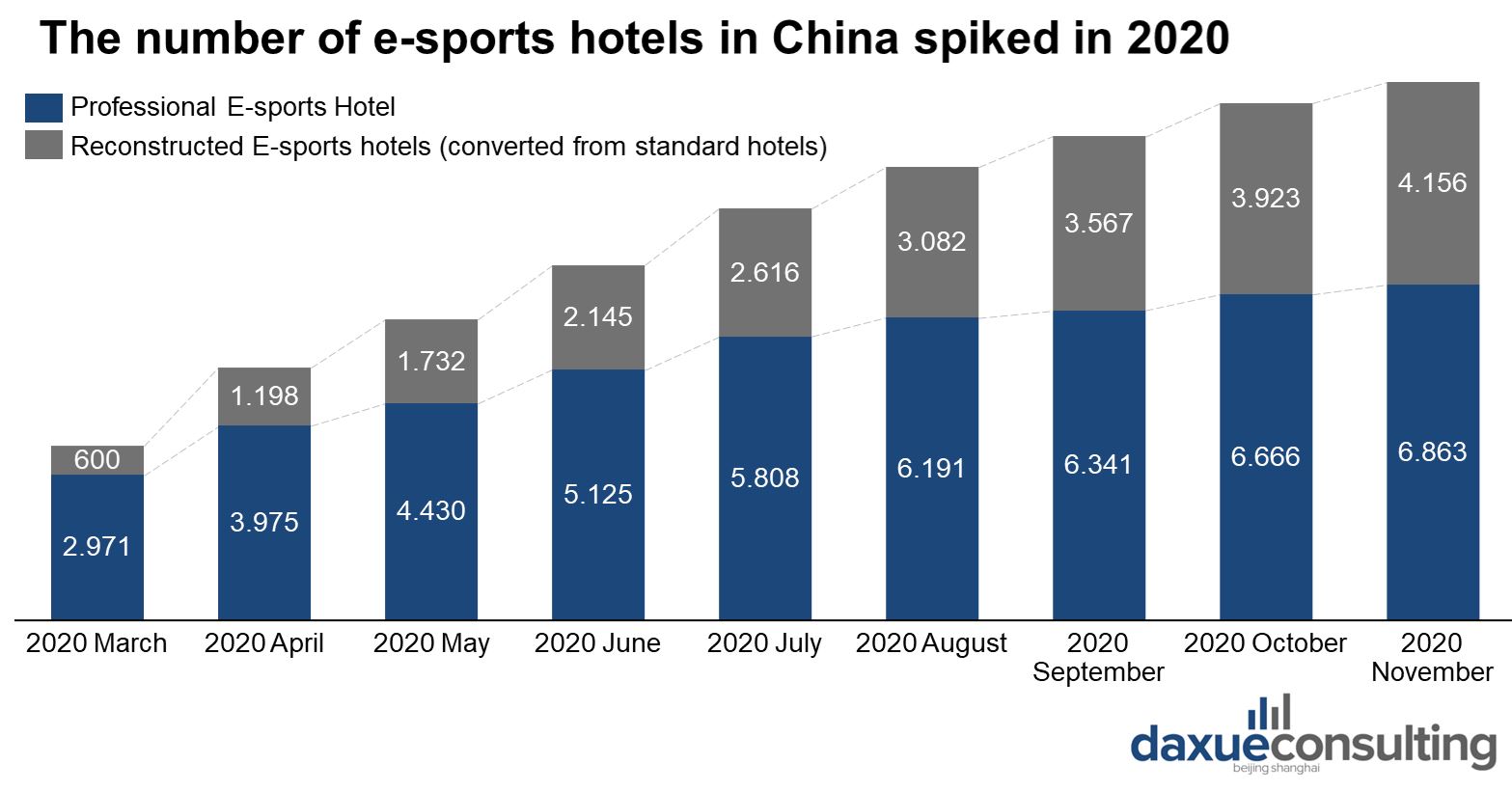
Data resource: jiudianrong.com, designed by daxue consulting, 2020 China’s e-sports hotel market size
Demand is transferring from internet café to e-sports hotel
The concept of e-sports hotels first originated in Japan. In 2017, e-sports hotels took the lead in China’s second-tier cities such as Zhengzhou and Xi’an. During 2018 and 2019, e-sports hotels sprang up like a mushroom in new first-tier cities and second-tier cities. In August 2019, there were only about 1,200 e-sports hotels in China. As of August 2020, the number of e-sport hotels reached 8,015, with a market growth of 568%.
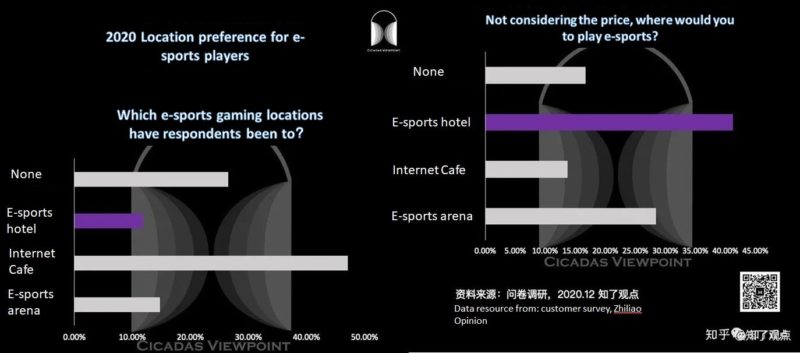
Data resources: Zhiliao Opinion, Chinese e-sports customer survey.
From a social perspective, China has gone through a period of consumption upgrade and consumer structure change. With a growth in the population of Generation Z and the internet economy, more people are looking for social interaction and a sense of belongingness. Meanwhile, gaming is one of the most popular activities among the young Chinese generation. A significant number of Chinese students go to internet cafés to play video games all night. Nowadays, the new generation of consumers seeks a personalized experiences. Thus, the immersive blast of e-sports hotels in China caught people’s attention.
2019 was the budding year for e-sports hotel chain brands. Through the entire year of accumulating development in 2020, in 2021, the competition of e-sports hotel chain brands in China will be even more fierce.
Most e-sports hotels are in the new first tier cities
The reason that most e-commerce hotels are built in new first tier cities, instead of tier 1 cities in China is that building a great e-sports hotel project requires a huge amount of capital. According to iResearch, a rough estimation to invest in an economy scale e-sports hotel in China is about 5 million yuan, while a high-end e-sports hotel with better facilities and higher room standards is expected to cost 10 million yuan in the initial stage.
Because of the high investment cost of e-sports hotels and expensive housing rent in first-tier cities in China, many investors and companies would like to make hotels in lower-tier cities. Therefore, the market of first-tier cities such as Beijing, Shanghai, Guangzhou, and Shenzhen is not as competitive as that of new first-tier cities and second-tier cities, such as Chengdu and Zhengzhou.
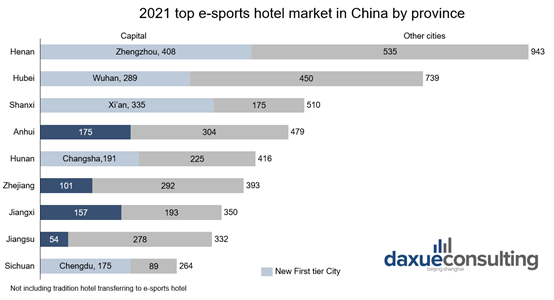
Data resource: Jiudianrong.com, designed by daxue consulting, 2021 top e-sports hotel market in China by province
The market is expanding fast in both big cities and small towns
Shanghai is the city of e-sports in China. From 2018 and 2019, 45.2% of domestic e-sports events chose Shanghai as the venue. Additionally, 52% of professional e-sports teams are based in Shanghai. However, in 2018, according to dianping.com, the number of e-sports hotels in Shanghai was only 12, which is 1/10 of the number in Zhengzhou. Nowadays, the market in Shanghai is expanding: on dianping (a restaurant and entertainment review platform), there are 108 e-sports hotels in Shanghai as of April 2021.
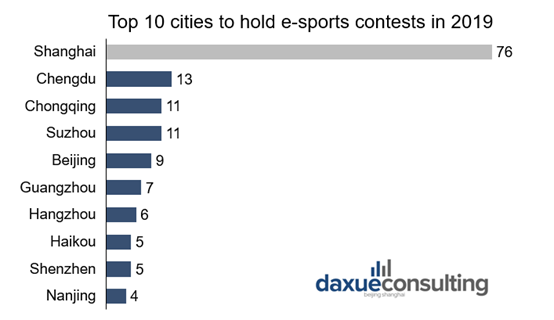
Data resource: Titan e-sports, designed by daxue consulting, Top 10 cities to hold e-sports contests in 2019.
The Beijing market is also looking good for e-sports. In 2020, the Beijing government released several subsidy schemes, aiming to turn Beijing into an e-sports hub. The initiative, called “E-sports Beijing 2020”, supports the construction of e-sports venues, teams, and public service platforms and encourages game content creation. So with the help of the policy, the growth of the e-sports market in Beijing will be exponential. Nonetheless, the potential risk is that e-sports is getting more professionalized. People might be more inclined to watch instead of play. Therefore, the demand for e-sports hotels in China might not increase as much as expected.
Future investment will concentrate on tier 3 and tier 4 cities where the pace of life is slower. Consumers in China’s third-tier and lower tiers cities account for more than 70% of the country’s consumers. Also, “small-town youth” have had more disposable income these days. The number of financial management account in the third tier and lower cities has increased by 14.13% annually, while in the first tier and second-tier cities, the number was -3.34%. Therefore, the growth of e-sports hotels in those cities will be easy and fast thanks to their excellent consumption potential.
Most e-sports hotels are in the economy scales
The concept originated from the internet café, which is a cheap place to stay and game. Some college students in China spend the whole night playing video games in internet cafés while students do not have much money, and most of the owners of e-sports hotels were the owner of an internet café. Therefore, most e-sports hotels are purely a place to play video games and get some rest. The average room rate of e-sports hotels in China is 234 yuan per night. In the star hotel rating system, the price of average e-sports hotels in China locates between 3-star and 4-star scale. According to the general hotel rating system, 61.11% of e-sports hotels are belong to the economy scale.
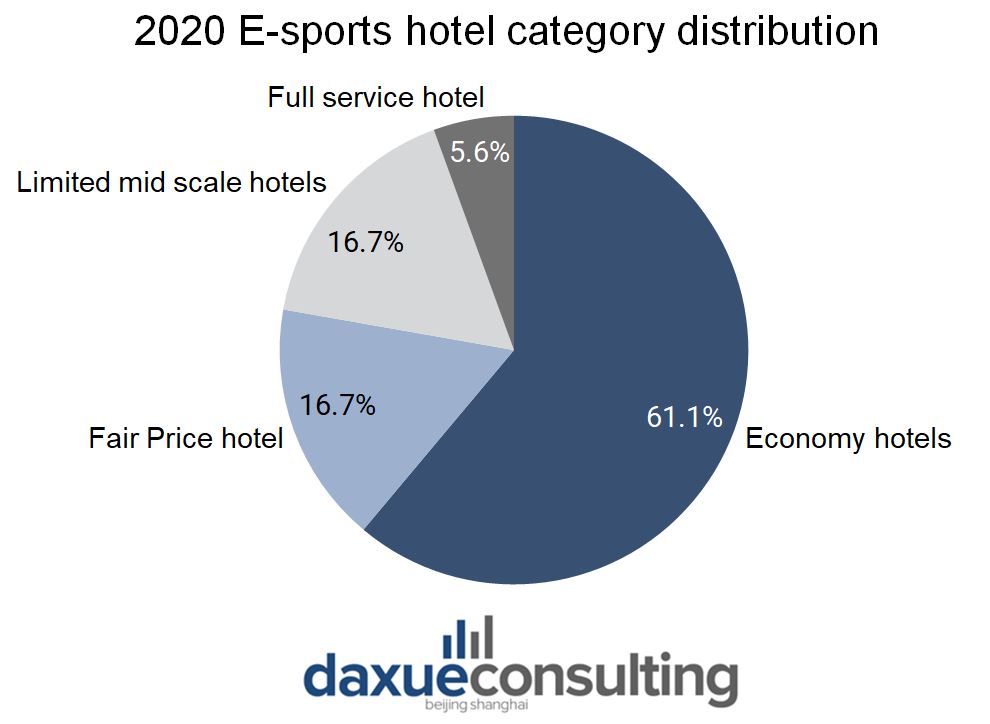
Data resource: Meadin.com, designed by daxue consulting,2020 E-sports hotel category distribution
Consumer insight for the e-sports hotel market in China
E-sports hotels are different from traditional hotels. 88% of guests are male, only 12% of guests are female. In terms of age, 72.31% of guests are 21-30 years old. Because e-sports hotels, a trendy concept, are favored by wealthy youth who happen to have time to have fun. The e-sports hotel market in China suits the demand for hedonic consumption.
Unlike the traditional hotel booking process, only 46% of guests reserve rooms from online travel agents (OTA). Trip.com is not the leading OTA for Chinese e-sports players: only 11% of bookings come from trip.com. Instead, Meituan accounts for 86% of the OTA reservation for e-sports hotels. 42% of guests make last-minute reservations by going straight to the hotel.
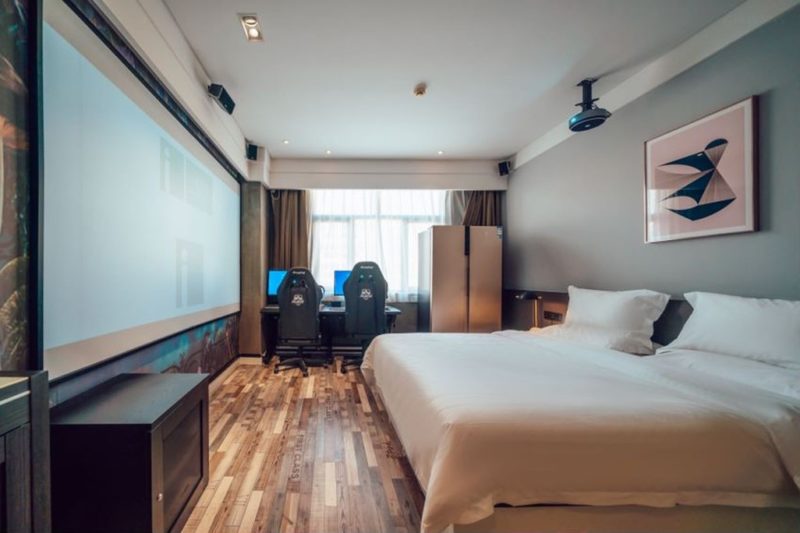
Photo source: trip.com, a picture taken by a guest on the comment section of an e-sports hotel in Zhengzhou
Unlike a traditional hotel, guests in an e-sports hotel spend more time in the room. The average time spent in an e-sport hotel room is 21.9 hours. Therefore, e-sports hotels have more potential to drive up food and beverage revenue. The average daily spending for a guest is 154 yuan. Also, e-sports hotel consumers are loyal guests. 81% of guests go to e-sport hotels once per month between March and May. 65.1% of consumers go to e-sport hotels once per month between September and November.
The brand chain has become the development trend of e-sport hotel market in China
With the accumulating development of 2020, in 2021 the top players in e-sports hotel chains are neck and neck. Many factors determine the best e-sports hotel brand, including the speed of expansion, the size of the brand, the level of market recognition, the reputation, etc. Here is the ranking of e-sports hotels in China from Zhiliao opinion.
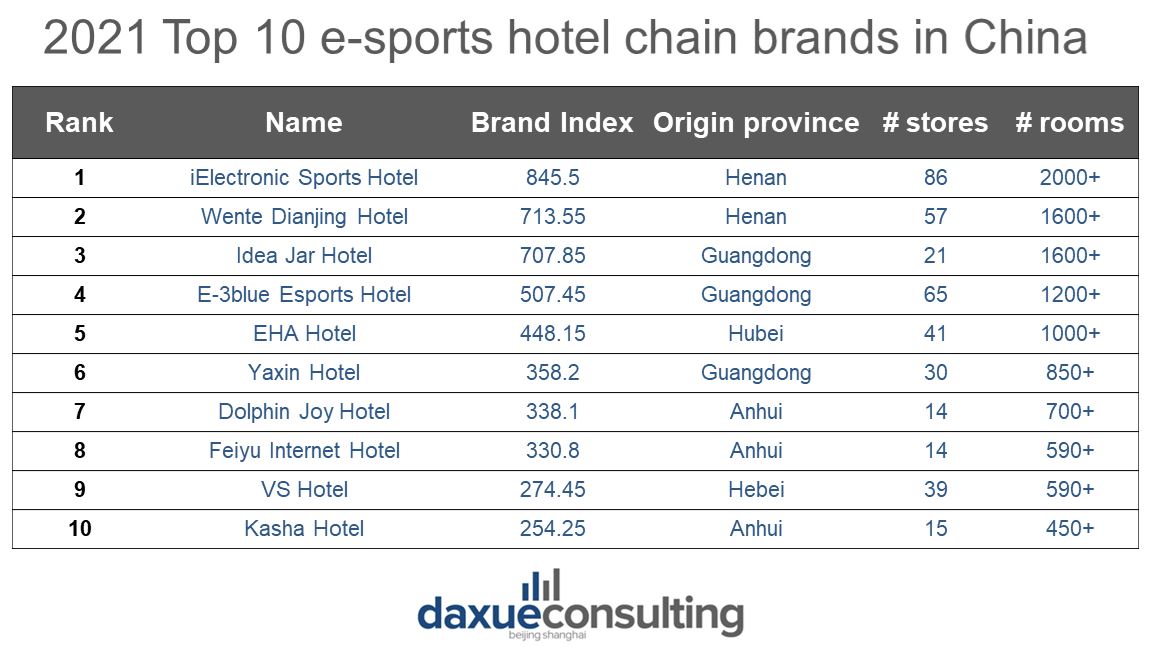
Data resources: Zhiliao Opinion, designed by daxue consulting, 2021 Top 10 e-sports hotel chain brands in China
Besides some old existing brands such as iElectronic sports Hotel and Wente Hotel, the rising hotel chains’ development momentum should not be underestimated. The trend has shown that the local e-sports hotel chain brands are emerging. The number of regional e-sports hotel brands in Guangdong and Anhui province have increased, with three brands listed in both provinces. Among the Top 10 e-sports hotel chain brands, eight hotel chains brands have franchise hotels more than directly operated stores. Some Top e-sports hotel chains have tried to blend other concepts in the hotel development, such as cinema theme hotel, virtual reality, professional e-sports training and AI.
E-sports themed hotels are trendy in China’s hotel industry because cultural tourism. Many industries can blend with the hotel industry. Muji, Alibaba, NetEase Cloud Music, Bulgari, and other brands have all developed their own themed hotels in China.
Takeaways for the e-sports hotel market in China
- E-sports hotels is a trendy hotel concept in China that integrates the demand for social, entertainment, and leisure.
- E-sports hotels originated in new first-tier cities. The post-Covid environment would embraced fierce competition among those cities. The market will expand to first-tier cities as well as lower-tier cities.
- 21-30 years old are the backbone of e-sports hotel consumers. The nature of social interaction, brand positioning, and detailed experience will directly affect their consumption choices.
- We have reasons to believe that the e-sports hotel market in China will embrace incredible growth in the future.
- E-sports hotels in China tap into the demand for blended hospitality and entertainment. This points to opportunities for other forms of entertainment, other than e-sports, to start hotel chains.
Author: Tong Zhu
Learn something new? Stay updated on the Chinese market by following our WeChat, scan the QR code below, or subscribe to our newsletter

Learn more about the e-sports market in China
Listen to over 100 China entrepreneur stories on China Paradigms, the China business podcast
Listen to China Paradigm on Apple Podcast




